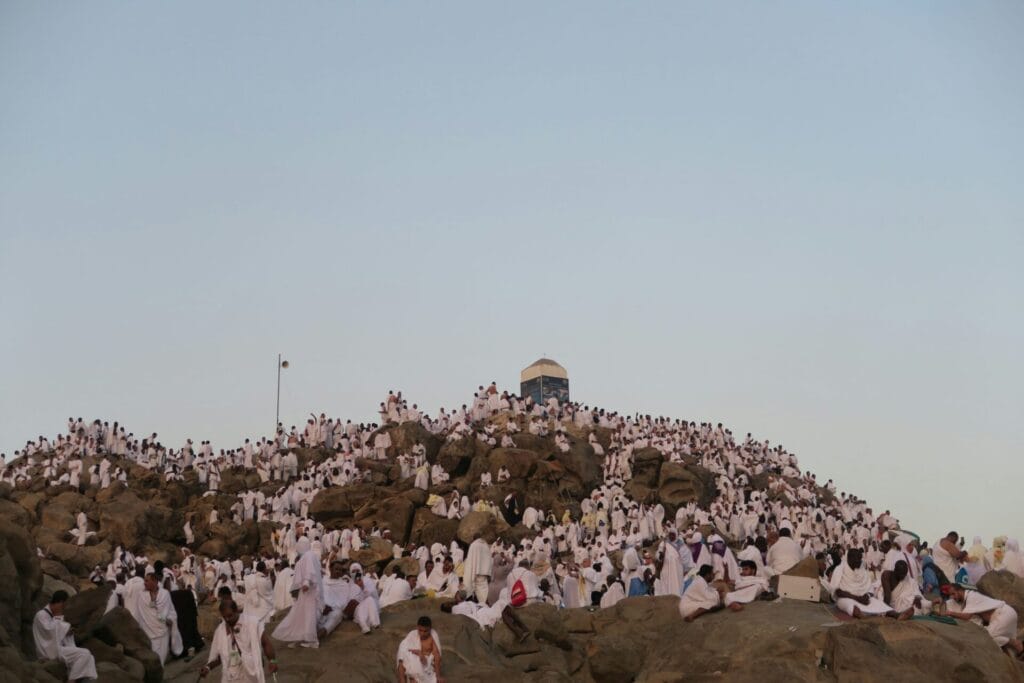Arafat holds a significant place in the Hajj journey, as it is the site where pilgrims gather on the 9th day of Dhu al-Hijjah, the 12th month of the Islamic lunar calendar. It is considered the most important day of Hajj, as it is believed to be the day when Allah forgives the sins of those who sincerely repent and seek forgiveness. The Prophet Muhammad (peace be upon him) said, “Hajj is Arafat.” This emphasizes the importance of Arafat in the pilgrimage, as it is the main pillar of Hajj. Standing at Arafat is a fundamental part of the pilgrimage, and it is believed that if a pilgrim misses this ritual, their Hajj is considered incomplete. The significance of Arafat lies in its association with the Day of Arafah, which is considered a day of forgiveness and mercy. It is a time for pilgrims to seek repentance, reflect on their lives, and seek closeness to Allah.
Arafat is also significant as it marks the culmination of the Hajj journey, where pilgrims come together in unity and devotion to fulfill one of the five pillars of Islam. It is a time for spiritual reflection and self-renewal, as pilgrims stand on the plains of Arafat seeking forgiveness and mercy from Allah. The significance of Arafat lies in its ability to bring people from diverse backgrounds and cultures together in a shared experience of worship and devotion. It is a powerful reminder of the unity and equality of all Muslims, regardless of their race, nationality, or social status. Arafat serves as a symbol of the universal brotherhood of Islam, where all are equal in the eyes of Allah, and where the focus is on spiritual devotion and seeking closeness to the Creator.
Historical and religious context of Arafat in Islam
Arafat holds historical and religious significance in Islam, as it is believed to be the site where Adam and Eve were reunited after being expelled from Paradise. According to Islamic tradition, Adam and Eve were separated after their expulsion from Paradise, and they were reunited at Arafat after wandering the earth for many years. This reunion symbolizes the mercy and forgiveness of Allah, as well as the importance of repentance and seeking forgiveness. The association of Arafat with this historical event adds to its religious significance, as it emphasizes the theme of repentance and forgiveness that is central to the Day of Arafah.
In addition to its historical significance, Arafat also holds religious importance as it is mentioned in the Quran and Hadith. The Quran refers to Arafat as the “mountain of mercy,” and it is believed that Prophet Muhammad (peace be upon him) delivered his farewell sermon at Arafat during his final pilgrimage. This sermon, known as the Farewell Sermon, emphasized the importance of unity, equality, and social justice, and it serves as a guiding principle for Muslims in their daily lives. The religious context of Arafat is rooted in its association with these historical events and teachings, which emphasize the themes of mercy, forgiveness, unity, and social justice that are central to Islam.
The rituals and practices observed at Arafat during Hajj
The rituals and practices observed at Arafat during Hajj are deeply rooted in Islamic tradition and serve as a means for pilgrims to seek forgiveness, mercy, and spiritual renewal. One of the main rituals observed at Arafat is Wuquf, which involves standing in prayer and supplication from noon until sunset. This ritual symbolizes the Day of Judgment when all humanity will stand before Allah seeking His mercy and forgiveness. Pilgrims also engage in reciting Quranic verses, making dua (supplication), and reflecting on their lives and seeking forgiveness for their sins. The act of standing at Arafat is a physical manifestation of spiritual devotion and serves as a means for pilgrims to seek closeness to Allah.
Another important ritual observed at Arafat is the symbolic stoning of the devil, which takes place at Mina. Pilgrims collect pebbles at Muzdalifah before heading to Mina to perform this ritual, which symbolizes the rejection of evil and temptation. This ritual serves as a reminder of the importance of resisting sin and temptation in one’s life and seeking forgiveness for past transgressions. The rituals and practices observed at Arafat during Hajj are designed to instill a sense of humility, devotion, and repentance in pilgrims, as they seek closeness to Allah and strive to purify their hearts and souls.
The spiritual and personal significance of Arafat for pilgrims
Arafat holds immense spiritual and personal significance for pilgrims, as it is a time for self-reflection, repentance, and seeking closeness to Allah. For many pilgrims, standing at Arafat represents a once-in-a-lifetime opportunity to seek forgiveness for their sins and renew their commitment to their faith. It is a time for introspection and self-evaluation, as pilgrims reflect on their lives and seek to purify their hearts and souls. The spiritual significance of Arafat lies in its ability to bring about a sense of spiritual renewal and transformation in pilgrims, as they seek to rid themselves of past transgressions and seek forgiveness from Allah.
On a personal level, Arafat represents a deeply emotional and transformative experience for many pilgrims. It is a time for deep introspection and soul-searching, as pilgrims confront their own shortcomings and seek to make amends for past mistakes. The personal significance of Arafat lies in its ability to bring about a sense of inner peace and spiritual fulfillment in pilgrims, as they seek to cleanse their hearts and souls from past sins. For many pilgrims, standing at Arafat represents a deeply personal journey towards self-improvement and spiritual growth, as they seek to become better individuals in the eyes of Allah.
The importance of supplication and reflection at Arafat
Supplication and reflection are central to the experience of Arafat during Hajj, as they serve as a means for pilgrims to seek forgiveness, mercy, and spiritual renewal. The act of making dua (supplication) is an integral part of the pilgrimage experience at Arafat, as it allows pilgrims to pour out their hearts to Allah and seek His mercy and forgiveness. Pilgrims engage in fervent prayer and supplication, asking for forgiveness for their sins, guidance in their lives, and blessings for themselves and their loved ones. The importance of supplication at Arafat lies in its ability to bring about a sense of spiritual connection and closeness to Allah, as pilgrims seek His mercy and forgiveness with sincerity and humility.
Reflection is also an important aspect of the pilgrimage experience at Arafat, as it allows pilgrims to contemplate their lives and seek self-improvement. Pilgrims reflect on their past actions, seek forgiveness for their sins, and make resolutions to become better individuals in the eyes of Allah. The act of reflection serves as a means for pilgrims to confront their own shortcomings and seek to make amends for past mistakes. It is a time for deep introspection and soul-searching, as pilgrims seek to purify their hearts and souls from past transgressions. The importance of reflection at Arafat lies in its ability to bring about a sense of inner peace and spiritual fulfillment in pilgrims, as they seek to become better individuals in the eyes of Allah.
Arafat as a symbol of unity and equality in Islam
Arafat serves as a powerful symbol of unity and equality in Islam, as it brings people from diverse backgrounds and cultures together in a shared experience of worship and devotion. Regardless of their race, nationality, or social status, all pilgrims stand together at Arafat seeking forgiveness from Allah. This serves as a powerful reminder of the universal brotherhood of Islam, where all are equal in the eyes of Allah. The emphasis on unity and equality at Arafat serves as a means for pilgrims to transcend their differences and come together in devotion to their faith.
The symbolism of unity at Arafat extends beyond the pilgrimage itself, as it serves as a reminder for Muslims around the world to come together in solidarity and mutual respect. The emphasis on unity at Arafat serves as a means for Muslims to overcome divisions within their communities and work towards common goals that benefit all members of society. It serves as a powerful reminder that regardless of one’s background or social status, all are equal in the eyes of Allah. The symbolism of unity at Arafat serves as a guiding principle for Muslims in their daily lives, encouraging them to work towards building inclusive communities that value diversity and promote mutual respect.
The lasting impact of Arafat on the Hajj journey and the Muslim community
The impact of Arafat on the Hajj journey extends beyond the pilgrimage itself, as it serves as a source of inspiration for Muslims around the world. The experience of standing at Arafat leaves a lasting impression on pilgrims, as it serves as a powerful reminder of the importance of seeking forgiveness, mercy, and spiritual renewal. Many pilgrims return from Hajj with a renewed sense of faith and commitment to their religion, inspired by their experience at Arafat. The lasting impact of Arafat on the Hajj journey lies in its ability to bring about a sense of spiritual transformation in pilgrims, as they seek to become better individuals in the eyes of Allah.
The impact of Arafat also extends to the Muslim community at large, as it serves as a source of inspiration for Muslims around the world. The emphasis on unity, equality, and social justice at Arafat serves as a guiding principle for Muslims in their daily lives, encouraging them to work towards building inclusive communities that value diversity and promote mutual respect. The lasting impact of Arafat on the Muslim community lies in its ability to bring people together in solidarity and mutual respect, transcending divisions within society. It serves as a powerful reminder that regardless of one’s background or social status, all are equal in the eyes of Allah.
In conclusion, Arafat holds immense significance in the Hajj journey for Muslims around the world. Its historical and religious context is deeply rooted in Islamic tradition, emphasizing themes such as mercy, forgiveness, unity, equality, social justice, supplication, reflection, spiritual renewal, personal growth, unity among Muslims worldwide. Its rituals are designed to instill humility devotion repentance among pilgrims who stand there seeking closeness with Allah while reflecting on their lives seeking forgiveness for past transgressions. Its impact extends beyond Hajj journey inspiring Muslims worldwide promoting unity equality mutual respect within Muslim communities transcending divisions within society bringing people together solidarity mutual respect regardless background social status all equal eyes Allah.
In conclusion, Arafat holds immense significance in the Hajj journey for Muslims around the world. Its historical and religious context is deeply rooted in Islamic tradition, emphasizing themes such as mercy, forgiveness, unity, equality, social justice, supplication, reflection, spiritual renewal, and personal growth. The rituals at Arafat are designed to instill humility, devotion, and repentance among pilgrims who stand there seeking closeness with Allah while reflecting on their lives and seeking forgiveness for past transgressions. Its impact extends beyond the Hajj journey, inspiring Muslims worldwide and promoting unity, equality, and mutual respect within Muslim communities. This transcends divisions within society, bringing people together in solidarity and mutual respect regardless of background or social status, as all are equal in the eyes of Allah.

